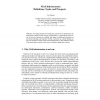160 search results - page 31 / 32 » Dynamics and control in component-based agent models |
113
click to vote
ATAL
2007
Springer
15 years 8 months ago
2007
Springer
Reinforcement learning promises a generic method for adapting agents to arbitrary tasks in arbitrary stochastic environments, but applying it to new real-world problems remains di...
145
click to vote
AGENTS
2000
Springer
15 years 6 months ago
2000
Springer
This paper attempts to articulate the general role of infrastructure for multi-agent systems (MAS), and why infrastructure is a particularly critical issue if we are to increase th...
135
click to vote
IEEESCC
2006
IEEE
15 years 7 months ago
2006
IEEE
Service composition aims to provide an efficient and accurate model of a service, based on which the global service oriented architecture (SOA) can be realized, allowing value add...
101
Voted
EUROPAR
2003
Springer
15 years 7 months ago
2003
Springer
Efficient discovery and resource allocation is one of the challenges of current Peer-to-Peer systems. In centralized approaches, the user requests can be matched to the fastest, ch...
112
Voted
ICML
1994
IEEE
15 years 5 months ago
1994
IEEE
Compositional Q-Learning (CQ-L) (Singh 1992) is a modular approach to learning to performcomposite tasks made up of several elemental tasks by reinforcement learning. Skills acqui...

